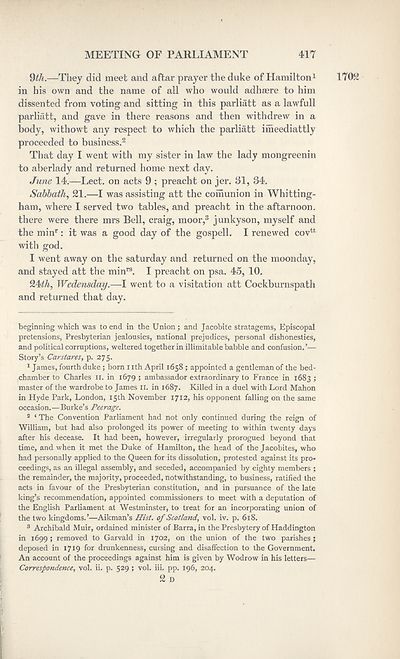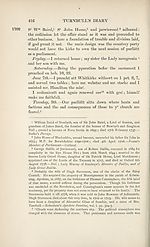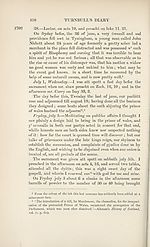Series 1 > Miscellany of the Scottish History Society (First volume)
(514) Page 417
Download files
Complete book:
Individual page:
Thumbnail gallery: Grid view | List view

MEETING OF PARLIAMENT
417
Qth.—They did meet and aftar prayer the duke of Hamilton1
in his own and the name of all who would adhaere to him
dissented from voting and sitting in this parliatt as a lawfull
parliatt, and gave in there reasons and then withdrew in a
body, withowt any respect to which the parliatt imeediattly
proceeded to business.2
That day I went with my sister in law the lady mongreenin
to aberlady and returned home next day.
June 14.—Lect. on acts 9 ; preacht on jer. 31, 34.
Sabbath, 21.—I was assisting att the comunion in Whitting-
ham, where I served two tables, and preacht in the aftarnoon.
there were there mrs Bell, craig, moor,3 junkyson, myself and
the minr: it was a good day of the gospell. I renewed covtt
with god.
I went away on the Saturday and returned on the moonday,
and stayed att the minrs. I preacht on psa. 45, 10.
24</t, Wedensday.—I went to a visitation att Cockburnspath
and returned that day.
beginning which was to end in the Union; and Jacobite stratagems, Episcopal
pretensions, Presbyterian jealousies, national prejudices, personal dishonesties,
and political corruptions, weltered together in illimitable babble and confusion.’—
Story’s Car stares, p. 275.
1 James, fourth duke ; born nth April 1658; appointed a gentleman of the bed¬
chamber to Charles II. in 1679 ; ambassador extraordinary to France in 1683 ;
master of the wardrobe to James II. in 1687. Killed in a duel with Lord Mahon
in Hyde Park, London, 15th November 1712, his opponent falling on the same
occasion.—Burke’s Peerage.
2 ‘ The Convention Parliament had not only continued during the reign of
William, but had also prolonged its power of meeting to within twenty days
after his decease. It had been, however, irregularly prorogued beyond that
time, and when it met the Duke of Hamilton, the head of the Jacobites, who
had personally applied to the Queen for its dissolution, protested against its pro¬
ceedings, as an illegal assembly, and seceded, accompanied by eighty members ;
the remainder, the majority, proceeded, notwithstanding, to business, ratified the
acts in favour of the Presbyterian constitution, and in pursuance of the late
king’s recommendation, appointed commissioners to meet with a deputation of
the English Parliament at Westminster, to treat for an incorporating union of
the two kingdoms.’—Aikman’s Hist, of Scotland, vol. iv. p. 618.
® Archibald Muir, ordained minister of Barra, in the Presbytery of Haddington
in 1699; removed to Garvald in 1702, on the union of the two parishes;
deposed in 1719 for drunkenness, cursing and disaffection to the Government.
An account of the proceedings against him is given by Wodrow in his letters—
Correspondence, vol. ii. p. 529; vol. iii. pp. 196, 204.
2 D
1702
417
Qth.—They did meet and aftar prayer the duke of Hamilton1
in his own and the name of all who would adhaere to him
dissented from voting and sitting in this parliatt as a lawfull
parliatt, and gave in there reasons and then withdrew in a
body, withowt any respect to which the parliatt imeediattly
proceeded to business.2
That day I went with my sister in law the lady mongreenin
to aberlady and returned home next day.
June 14.—Lect. on acts 9 ; preacht on jer. 31, 34.
Sabbath, 21.—I was assisting att the comunion in Whitting-
ham, where I served two tables, and preacht in the aftarnoon.
there were there mrs Bell, craig, moor,3 junkyson, myself and
the minr: it was a good day of the gospell. I renewed covtt
with god.
I went away on the Saturday and returned on the moonday,
and stayed att the minrs. I preacht on psa. 45, 10.
24</t, Wedensday.—I went to a visitation att Cockburnspath
and returned that day.
beginning which was to end in the Union; and Jacobite stratagems, Episcopal
pretensions, Presbyterian jealousies, national prejudices, personal dishonesties,
and political corruptions, weltered together in illimitable babble and confusion.’—
Story’s Car stares, p. 275.
1 James, fourth duke ; born nth April 1658; appointed a gentleman of the bed¬
chamber to Charles II. in 1679 ; ambassador extraordinary to France in 1683 ;
master of the wardrobe to James II. in 1687. Killed in a duel with Lord Mahon
in Hyde Park, London, 15th November 1712, his opponent falling on the same
occasion.—Burke’s Peerage.
2 ‘ The Convention Parliament had not only continued during the reign of
William, but had also prolonged its power of meeting to within twenty days
after his decease. It had been, however, irregularly prorogued beyond that
time, and when it met the Duke of Hamilton, the head of the Jacobites, who
had personally applied to the Queen for its dissolution, protested against its pro¬
ceedings, as an illegal assembly, and seceded, accompanied by eighty members ;
the remainder, the majority, proceeded, notwithstanding, to business, ratified the
acts in favour of the Presbyterian constitution, and in pursuance of the late
king’s recommendation, appointed commissioners to meet with a deputation of
the English Parliament at Westminster, to treat for an incorporating union of
the two kingdoms.’—Aikman’s Hist, of Scotland, vol. iv. p. 618.
® Archibald Muir, ordained minister of Barra, in the Presbytery of Haddington
in 1699; removed to Garvald in 1702, on the union of the two parishes;
deposed in 1719 for drunkenness, cursing and disaffection to the Government.
An account of the proceedings against him is given by Wodrow in his letters—
Correspondence, vol. ii. p. 529; vol. iii. pp. 196, 204.
2 D
1702
Set display mode to:
![]() Universal Viewer |
Universal Viewer | ![]() Mirador |
Large image | Transcription
Mirador |
Large image | Transcription
Images and transcriptions on this page, including medium image downloads, may be used under the Creative Commons Attribution 4.0 International Licence unless otherwise stated. ![]()
| Scottish History Society volumes > Series 1 > Miscellany of the Scottish History Society (First volume) > (514) Page 417 |
|---|
| Permanent URL | https://digital.nls.uk/127087029 |
|---|
| Attribution and copyright: |
|
|---|
| Description | Over 180 volumes, published by the Scottish History Society, containing original sources on Scotland's history and people. With a wide range of subjects, the books collectively cover all periods from the 12th to 20th centuries, and reflect changing trends in Scottish history. Sources are accompanied by scholarly interpretation, references and bibliographies. Volumes are usually published annually, and more digitised volumes will be added as they become available. |
|---|


